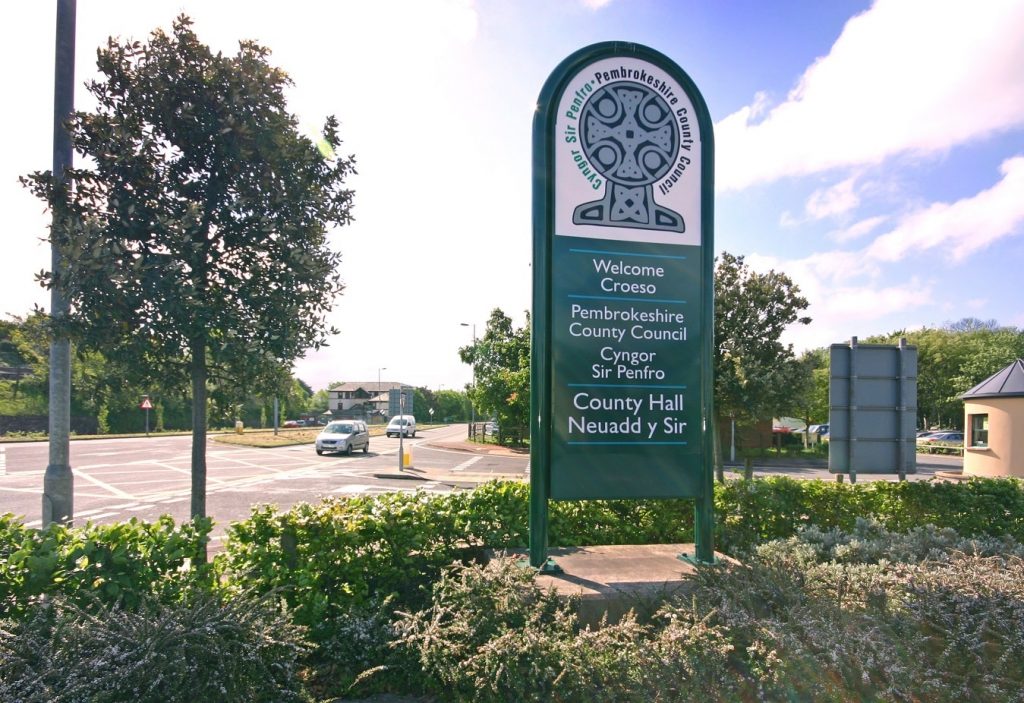News
Is the Council’s Head of Legal Services seeking a large pay-off?

AN EXTRAORDINARY meeting of Pembrokeshire County Council will take place on Monday, November 8. The only agenda item is described as “Settlement Agreement”. The question is: whose?
WHO WANTS TO SETTLE?
East Williamston councillor Jacob Williams revealed the agenda item doesn’t relate to former CEO Ian Westley.
Only senior officers’ payoffs come before the Full Council for discussion.
Bearing in mind the recent formation of a disciplinary panel to deal with senior staff and the expected explosion of activity when the Audit Wales report into Mr Westley’s departure lands, it isn’t unreasonable to state that the proposed settlement agreement must deal with a person who might be subject to the new disciplinary procedure.
That disciplinary procedure encompasses senior statutory officers (posts the Council must have by law).
The statutory officers are the Chief Executive, the Monitoring Officer, the Head of Legal Services, the Chief Financial Officer (usually called the “s151 officer”).
We can discount the Chief Executive (Will Bramble, who has only just taken up his post) and the Monitoring Officer (Claire Jones fell on her sword as soon as she saw the extract of the draft Audit Wales report dealing with her role in Mr Westley’s departure).
A PROCESS OF ELIMINATION
That leaves two officers.
Jon Haswell, the Council’s Finance Director, and Claire Incledon, the Head of Legal Services.
Ms Incledon has been on long-term sick leave since the extract of the draft Audit Wales report landed on her doormat.
Mr Haswell has, however, been ever-present in Council decision making.
It does not take much of a Poirot to work out which of the two officers is more likely to seek a settlement agreement at this time.
Making the educated guess that Ms Incledon is prepared to seek terms and has signalled which terms she wants leaves the Council with interlocking problems impossible to resolve without a cost to the Council taxpayer.
Whichever route the Council chooses, regardless of the senior officer’s identity, presents difficulties.
A LAWYER’S VIEW
We asked a vastly experienced in-house lawyer with particular expertise in public sector employment for their view.
They took it as read that no councillor would discuss the matter in public and described those who would do so in sulphurous terms.
They told us it was a question of how the Council looked at risk and minimising its financial exposure.
In the worst-case scenario, the Council decides not to settle with the officer on any terms and proceeds to a disciplinary procedure involving an independent external investigator (almost certainly a senior lawyer).
The officer subject to the process remains on the Council payroll while the disciplinary procedure takes place. In addition, the Council will have to bear the costs of the procedure both in terms of professional fees incurred to advise the disciplinary panel and the investigating officer.
That sum alone could easily exceed £50,000, and our lawyer said he would not be surprised at a far higher bill.
Suppose the investigating officer finds misconduct short of that justifying dismissal. In that case, the Council is back to square one with an employee that wants away. In short, the Council still faces making a payoff.
It gets worse.
Suppose an investigating officer reaches conclusions that suggest dismissal is the only appropriate remedy. In that case, it is still open to the employee to challenge their conclusions and take their chances at an employment tribunal.
In that instance, there would be massive additional costs and additional litigation risk.
We are at least six months away from that point.
And, as of today, we do not even have the Audit Wales report upon which so much will hinge.

THE AUDIT WALES REPORT
We can only guess at the content of the Audit Wales report regarding individual officers’ conduct during the negotiations surrounding Mr Westley’s departure.
Forget the why; the question before Audit Wales relates only to the process behind the payoff and not its motivations or causes.
We already know several things.
The payment made to Mr Westley was unlawful.
We also know the Leader must have taken legal advice on the content and procedure concerning the former CEO’s departure terms.
We know that advice came from the Council’s officers, particularly the Monitoring Officer and Head of Legal.
We can conclude if the agreement was entered into unlawfully, the advice given about it was in some way defective.
Even Jamie Adams and the Senior Officers’ Fan Club in the IPG must know it beggars belief that either David Simpson or Jonathan Haswell would have signed off on an agreement knowing it was unlawful.
There is also one tactical consideration.
Once the Audit Wales report comes out, whenever that will be, the officer’s hand is likely to be significantly weakened by any criticisms of them contained within it. Once they have the report, its content could considerably harden councillors’ hearts.
POLITICAL CONSIDERATIONS
It is likely, if not certain, the absence of the Audit Wales report will persuade a majority of councillors to hold fire on any negotiations.
It will suit some councillors (especially Jamie Adams) to spin out events as long as possible, leaving matters probably unresolved until after May’s election. At which point, someone as cynical as Cllr Adams knows were he returned as Leader, he’d probably sign a settlement agreement as soon as possible.
Equally, more bullish councillors might want to resist any settlement on the principle that a disciplinary procedure should run its course, regardless of the risks and costs attached.
Yet others might want to keep rocking the boat for their political ends and to keep their name before the public ahead of the next May’s Council elections.
What is certain is that nobody wants to pay off another officer.
It’s equally certain not every officer is prepared to hand in their notice when they’re found to have made an expensive mistake.
This article was originally published in The Pembrokeshire Herald print edition on Friday, November 5, 2021
Local Government
Independent panel gives positive verdict on Pembrokeshire County Council

Four-day assessment highlights improvement, leadership and governance
AN INDEPENDENT panel has concluded that Pembrokeshire County Council is meeting its statutory performance requirements and has shown improvement across a number of key areas.
The findings follow a four-day visit in October 2025, when a group of external peers carried out a Panel Performance Assessment (PPA), a process required once every electoral cycle under Welsh Government legislation.
The purpose of the PPA is to provide an independent expert view on how effectively the council is using its functions, how it deploys resources, and whether its governance arrangements are fit for purpose.
The four-member panel was led by Phil Roberts, independent chair and former chief executive of Swansea Council. Other members were Cllr Anthony Hunt, leader of Torfaen Council; Emma Palmer, chief executive of Powys Council; and Andrea Street OBE, representing the public, private and voluntary sectors.
In its final report, the panel concluded that Pembrokeshire County Council is meeting its statutory requirements and commented favourably on many aspects of its work. The authority was described as effective, having responded well to a challenging financial position and demonstrated improvement in a number of key areas.
Among the report’s findings was praise for “a cohesive cabinet, which despite its rainbow coalition arrangements, exercises a model of distributed leadership which is particularly effective”. The panel also highlighted “a committed Senior and Extended Leadership Team who recognised the journey of improvement the council has been on under the Chief Executive’s strong leadership”.
The panel further noted “a broad set of values and behaviours consistently demonstrated across the organisation, from the Senior Leadership Team to frontline staff”, adding that there was “a genuine desire to work in the interests of the communities and residents of the county”.
While the overall assessment was positive, the report also identified areas where further progress could be made. Seven recommendations were set out, covering scrutiny arrangements, corporate capacity, collaborative leadership, economic regeneration capacity, resource prioritisation, communications, and transformation and innovation.
Council leader Jon Harvey welcomed the report, describing the assessment as a constructive experience.
“This was an extremely positive experience for the council, and an opportunity to learn and benefit from the views and perspectives of independent experts from outside the authority,” he said. “We welcome the assurance provided by the panel that we are on the right track, and the feedback which has helped to identify opportunities and areas for improvement.”
Cllr Harvey also thanked panel members for their work, along with officers from the Welsh Local Government Association who supported the assessment process.
“We accept the panel’s findings in full and I am convinced that the action plan we have developed in response to the recommendations will enable us to further strengthen key areas of our work so we can continue to provide quality services to our residents and communities,” he added.
In line with legislation, the council has produced a formal response and action plan setting out how it will address the panel’s recommendations. These will be presented to Cabinet on February 9 and to full council on March 5 for formal approval.
News
Kurtz calls on Labour MPs to back release of Mandelson papers

Opposition motion follows Epstein-linked document disclosures
A SENEDD Member has called on Labour MPs to support a Conservative Opposition Day Motion demanding the release of papers linked to Peter Mandelson’s appointment as the UK Ambassador to the United States.
Samuel Kurtz said the motion follows the publication of new files and photographs involving Lord Mandelson, which were released as part of a United States investigation into the disgraced and convicted child sex offender Jeffrey Epstein.
Speaking out, Mr Kurtz said that during Prime Minister’s Questions, the Prime Minister admitted he was aware of Peter Mandelson’s ongoing relationship with Epstein at the time of his appointment.
“That means the Prime Minister knowingly appointed Peter Mandelson to one of the most important diplomatic roles in government despite his links to Epstein,” he said. “This raises serious questions about the Prime Minister’s judgement.”
Mr Kurtz went on to accuse the Prime Minister of attempting to prevent transparency over the appointment process.
“Now, instead of being open and transparent, the Prime Minister is attempting to block the release of documents relating to Mandelson’s appointment in order to protect his own position,” he said.
He warned that Labour MPs who oppose the motion would share responsibility for withholding information, adding: “If Labour MPs support blocking the release of these papers, they will be complicit in covering up the process and judgement that led the Prime Minister to appoint Peter Mandelson as Ambassador, despite his friendship with Jeffrey Epstein.”
Crime
Drink-driver narrowly avoided collision in town centre

Motorist almost three times over legal limit
A DRINK-driver narrowly avoided crashing into another vehicle while almost three times over the legal alcohol limit, a court has heard.
Nathan Lloyd, 33, was seen driving a Nissan X-Trail in Haverfordwest in the early hours of December 20 without headlights.
Police followed the vehicle, which narrowly missed a car and struck a kerb before being stopped.
Lloyd, of Adams Drive, Narberth, recorded a breath reading of 97 micrograms of alcohol, nearly three times the legal limit.
He was disqualified from driving for two years and given a 12-month community order requiring 80 hours of unpaid work and 20 rehabilitation days. He was ordered to pay £114 surcharge and £85 costs.
-

 Health6 days ago
Health6 days agoConsultation reveals lack of public trust in health board
-

 Community7 days ago
Community7 days agoPembrokeshire students speak at national Holocaust Memorial Day event
-

 News1 day ago
News1 day agoPrincess of Wales visits historic Pembrokeshire woollen mill
-

 Crime5 days ago
Crime5 days agoPembroke man accused of child sex offences sent to Swansea Crown Court
-

 Education7 days ago
Education7 days ago‘Vulnerable teen’ questioned by police at Milford Haven School
-

 Education7 days ago
Education7 days agoAttendance concerns at Milford School reflect wider issue raised at the Senedd
-

 Community6 days ago
Community6 days agoCampaign to ‘save’ River Cleddau hits over 2,200 signatures
-

 Health3 days ago
Health3 days agoDoctor struck off after sexual misconduct findings at Withybush Hospital



































